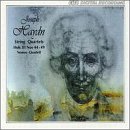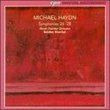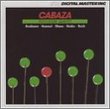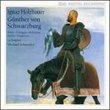Haydn's Opus 50 Prussian Quartets in Very Good Performances
Doug - Haydn Fan | California | 08/09/2010
(5 out of 5 stars)
"These recordings of Haydn's oft over-looked "Prussian" Quartets, Op.50, derive from recordings made under the auspices of Radio Bremen in the early Nineties; at the time the Nomos Quartet was nearing its tenth year, and perhaps not surprisingly the four musicians play together with great assurance. Balancing drama and lyricism, the group calls to mind earlier very august quartets, and I had to pull down a recording of the old Hollywood Quartet at one point as a benchmark. Even up against such suave company these remain truly fine quartet players. Frankly I'm quite surprised a group of this quality has recorded no other Haydn, nor any Mozart. Perhaps it is fitting their one recording of Haydn well presents music that, like their playing, is also much less heard than it should be!
For anyone who enjoys other Haydn quartets but is unfamiliar with Haydn's Op 50, this recording certainly makes an excellent introduction. Haydn seems rather Faustian in the magnitude of musical ideas and forms he introduces and plays out throughout these quartets. Make no mistake - this is music of a very high order, setting out a staggering range of ideas and unifying their wide often whimisical diversity with an ease that calls to mind Beethoven. Published in 1786, the Opus 50 Quartets offer stunning music, all given out in the most deceptively natural manner. I cannot think of any composer in history who makes such complex music-making sound so staightforward and accessible - anyone else attempting such a compression would come across as pedagogic and stilted. Through some alchemy known only tio himself, Haydn makes it all seem as easy as setting a common folk tune - and folk music is something Haydn happily includes as readily as the most complicated couterpoint.
When I first heard the opening quartet in B flat Major, many decades ago, most of Haydn's art that disquises art was quite beyond me. The first movement's development section alone left me happily perplexed with delight - I'd follow the score and listen, then go back again and start over. How so many ideas could be generated, discussed, considered, revisited, rearranged, and finally transformed into an entirely surprising and fresh new result seemed beyond black magic or sorcery. The oft-mentioned surprise ending of the first movement, wherein Haydn, having confused beginnings and endings right from the start, returns to normalcy with a, "Who, me?" innocence, captures the grandest possible musical drollery. Yet, as if so often the case with Haydn - once heard this laugh out loud moment somehow sounds not only acceptable, but quite the only way things should go, have to go!
These days I can follow Haydn's adventuresome music-making much better, but I still am caught up by new glimpses of his sharp sense of humor, his cunning and cleverness. This is a composer who revels in the great wealth of hard earned musical knowledge, kept readily at his fingertips, and somehow Haydn manages to get it all in without ever over-doing it and spoiling the soup. Instead he uses his encylcopedic variety of musical forms coupled with a non stop curiousity to enliven and spice the goings-on.
One last observation - don't fail to replay the last movement of the C Major! Wow!
This set includes copious detailed notes about each of the quartets, with many musical examples. The notes are in German, English, and French. A professional musician would probably be best suited to appreciating so large a helping of such detailed musical summaries. But the rest of us amateurs can follow along pretty well to much of it.
The sound recording - all digital - is quite good to excellent - try playing your Cd a tad louder than normal to bring out the quartet's color and placement. This two Cd set also comes at a most reasonible price.
If you haven't already heard Haydn's Opus 50, the "Prussian" Quartets, you have a lifetime's pleasure awaiting you - this is music that only improves and glows ever more alive and novel with each new listening. I've been playing these quartets on records, and on a few rare and lucky occasions hearing an example in concert, for going on five decades, and each time I marvel at Haydn's absolute assurance and aplomb. Haydn challenges himself with purposely set musical puzzles, we mortals get to enjoy the ride.
One can only wonder at the miracle that brought Haydn, Mozart, and Beethoven into the world at what for all intents and purposes in historical time was the same moment. Of the three, Haydn was far the most self-deprecating, and it is this genuine humility of his, along with his modesty and deep affection before Mozart's genius, that has left many to underestimate Haydn's own greatness. In his string quartets Haydn need take a back seat to no one, not even his two supremely gifted contemporaries. Haydn's best quartets are not only one of the pinnacles of his art, but some of the greatest and most enriching masterpieces of Western Art."


 Track Listings (12) - Disc #1
Track Listings (12) - Disc #1

